CIRJE Conferences 2015
- Academic Conference in Memory of Masahiko Aoki: Comparative Institutional Analysis and the Future of Economics, February 19, 2016
- The 12th Joint conference of Seoul National University and University of Tokyo, Current Topics in Economic Theory, January 22, 2016
- 2015-16 9th Asian Conference on Applied Micro-Economics/Econometrics, January 9 and 10, 2016
- 25th NBER-TCER-CEPR Conference on International Finance in the Global Markets, December 16 and 17, 2015
- Workshop on "Institutions, Preferences and Economic Development", December 14, 2015
- "Poor Economics" in Tokyo: Frontiers of Development Economics, August 3, 2015
- The XVIIth World Economic History Congress, August 3-7, 2015
- 2015 Summer School of Econometric Society, August 3-7, 2015
- IO Conference at The University of Tokyo, June 26 and 27, 2015
- Workshop "Incentives, Preferences, and Management in Developing and Developed Countries", April 9, 2015
Academic Conference in Memory of Masahiko Aoki:
Comparative Institutional Analysis and the Future of Economics
Co-sponsored by Nippon Hyoron Sha Co., Ltd.
- February 19, 2016
- Venue: Kojima Conference Room, Economics Research Annex (Kojima Hall), The University of Tokyo
- Program
- Comments from participants and more photos (in Japanese)
On February 19, an academic conference, “Comparative Institutional Analysis and the Future of Economics in memory of Professor Masahiko Aoki” was held by nine organizers, Hideshi Itoh, Takashi Ui, Hideo Owan, Masahiro Okuno-Fujiwara, Michihiro Kandori, Yasuyuki Sawada, Yasuyuki Todo, Akihiko Matsui, and Chiaki Moriguchi. This conference was composed of nine papers in three sessions, (1) Finance and Governance, (2) Organization and Labor, and (3) Development and History in which about 75 participants join lively discussions on theoretical and empirical studies of comparative institutional analysis.
The 12th Joint conference of Seoul National University and University of Tokyo
Current Topics in Economic Theory
- Organizers:
The Institute of Economic Research and the Center for Distributive Justice,
CIRJE, The Center for International Research on the Japanese Economy - January 22, 2016
- Venue: Kojima Conference Room, Economics Research Annex (Kojima Hall), The University of Tokyo
- Program
The Joint Conference with Seoul National University (SNU) was held at Kojima Conference Room, Kojima Hall, Faculty of Economics, University of Tokyo on Friday, January 22, 2016. This was the twelfth annual conference series between CIRJE and Institute of Economic Research in SNU. The theme of the conference was "Current Topics in Economic Theory." After welcome speech by Katsumi Shimotsu (Director, CIRJE), we had wonderful speakers and fruitful discussions on the related issues. Michihiro Kandori, Daniel Marszalec, Hiroshi Matsushima, and Daisuke Oyama attended the conference as either a speaker or a discussant from University of Tokyo. From SNU, Chul-In Lee and Yves Gueron presented their interesting papers, while Jihong Lee and Biung-Ghi Ju served as a discussant. Amalgamation between economic theory and real-life phenomena as well as experimental data has been on the frontiers of economic theory. We had intense discussion on issues such as interpretation of the community union as equilibrium of an overlapping generations repeated game and development of a new theory to explain the result of an experiment under imperfect and private monitoring. At the end of the conference, we confirmed further collaborations between CIRJE and Institute of Economic Research in SNU.
2015-16 9th Asian Conference on Applied Micro-Economics/Econometrics
- Organizers:
Kamhon Kan, Academia Sinica
Daiji Kawaguchi, Hitotsubashi University
Jinyoung Kim, Korea University
Jungmin Lee, Sogang University
Myoung-Jae Lee, Korea University
Albert Park, Hong Kong University Science and Technology Yasuyuki Sawada, University of Tokyo - Local Committee:
Yasuyuki Sawada, University of Tokyo
Daiji Kawaguchi, Hitotsubashi University - Funding:
Risk and Well-Being under Changing Global Society Project, JSPS Grant-in-Aid for Scientific Research (S), University of Tokyo
Center for Research on Contemporary Economic Systems, Graduate School of Economics, Hitotsubashi University
A New Step in the Development of Suicide Prevention Policy by Interdisciplinary Approach with An International Scope
funded by Japanese Ministry of Health, Labour and Welfare (Project Number H26-Seishin-Ippan-003 (2014-2016)),
Kyoto Prefectural University of Medicine - January 9 and 10, 2016
- Venue: Kojima Conference Room, Economics Research Annex (Kojima Hall), The University of Tokyo
- Program
Dr. Yasuyuki Sawada of the University of Tokyo organized an international conference: 2015-16 9th Asian Conference on Applied Micro-Economics/Econometrics on January 9 and 10, 2016. The local committee members include Dr. Yasuyuki Sawada of the University of Tokyo and Dr. Daiji Kawaguchi of Hitotsubashi University. The sessions include Labor Economics; Ability, Morbidity, and Mortality; Political Economy; Competition, Discrimination, and Segregation; Econometric Theory and Applications. For example, Daiji Kawaguchi (Hitotsubashi University) presented a paper on the impact of alcohol consumption on earnings. Gordon B. Dahl (University of California San Diego) presented a paper on how politicians change public attitudes. Yasuyuki Sawada (The University of Tokyo) presented a paper on how school-based management programs increases social capital. Arthur Lewbel (Boston College) presented a paper on unobserved preference heterogeneity in demand using generalized random coefficients. Speakers and participants had lively and engaged discussions on topics of applied economics and econometrics.
25th NBER-TCER-CEPR Conference on International Finance in the Global Markets
- Organizers:
Kosuke Aoki
Shin-ichi Fukuda
Takeo Hoshi
Takashi Kano - Sponsors:
Center for Economic Policy Research, National Bureau of Economic Research
Tokyo Center for Economic Research, the Center for Advanced Research in Finance
The Center for International Research on the Japanese Economy - December 16 and 17
- Meeting room, Economics Research Building, The University of Tokyo
- Program
The 25th TRIO conference of this academic year took place on 16th and 17th of December 2015 at Department of Economics 6th Floor Conference Room, University of Tokyo. This is a joint conference series sponsored by Center for Economic Policy Research (CEPR), National Bureau of Economic Research (NBER), and Tokyo Center for Economic Research (TCER). Center for International Research on the Japanese Economy (CIRJE) as well as Center for Advanced Research in Finance (CARF) supported the conference this year. The theme of the conference was "International Finance in the Global Markets." The topic is one of today's most important issues in Europe, the US, and Japan. While each region faces a different economic environment, it commonly faces potential risk of secular stagnation under highly expansionary unconventional monetary policy. To analyze the causes and the consequences of these unprecedented environments is an urgent policy issue in each region. From the University of Tokyo, Shin-ichi Fukuda and Masahiro Kawai presented a paper, and Kosuke Aoki and Kenichi Ueda served as a discussant. From abroad, Gianluca Benigno (LSE), Andrew Rose (University of California at Berkeley), Charles Engel (University of Wisconsin), Vahagn Galstyan (Trinity College Dublin), Fabio Ghironi (University of Washington), Kiminori Matsuyama (Northwestern University), Takeo Hoshi (Stanford University) participated in the conference. We had intensive and fruitful discussions on the important policy issues.
Workshop on "Institutions, Preferences and Economic Development"
- Organizer: SNU 2015 Project "Building a Foundation for National Unification"
- December 14, 2015
- Venue: Seminar Room 1, Economics Research Annex (Kojima Hall), The University of Tokyo
- Program
On December 14, Workshop on “Institutions, Preferences and Economic Development” by Seoul National University Project, “Building a Foundation for National Unification” was held at CIRJE. In this workshop, Robert Veszteg (Waseda University), Jiahua Che (Fudan University), Syngjoo Choi (Seoul National University, Tatsuyoshi Saijo (Hitotsubashi University), Harounan Kazianga (Oklahoma State University), Yasuyuki Sawada (University of Tokyo), Daniel Aldrich (Northeastern University) made each presentation on behavioral economics, experimental economics, or field experiments with lively discussions on a variety of academic issues.
"Poor Economics" in Tokyo: Frontiers of Development Economics
- Organizer: Yasuyuki Sawada (The University of Tokyo)
- August 3, 2015
- Venue: Meeting Room, Economics Research Building, The University of Tokyo
- Program
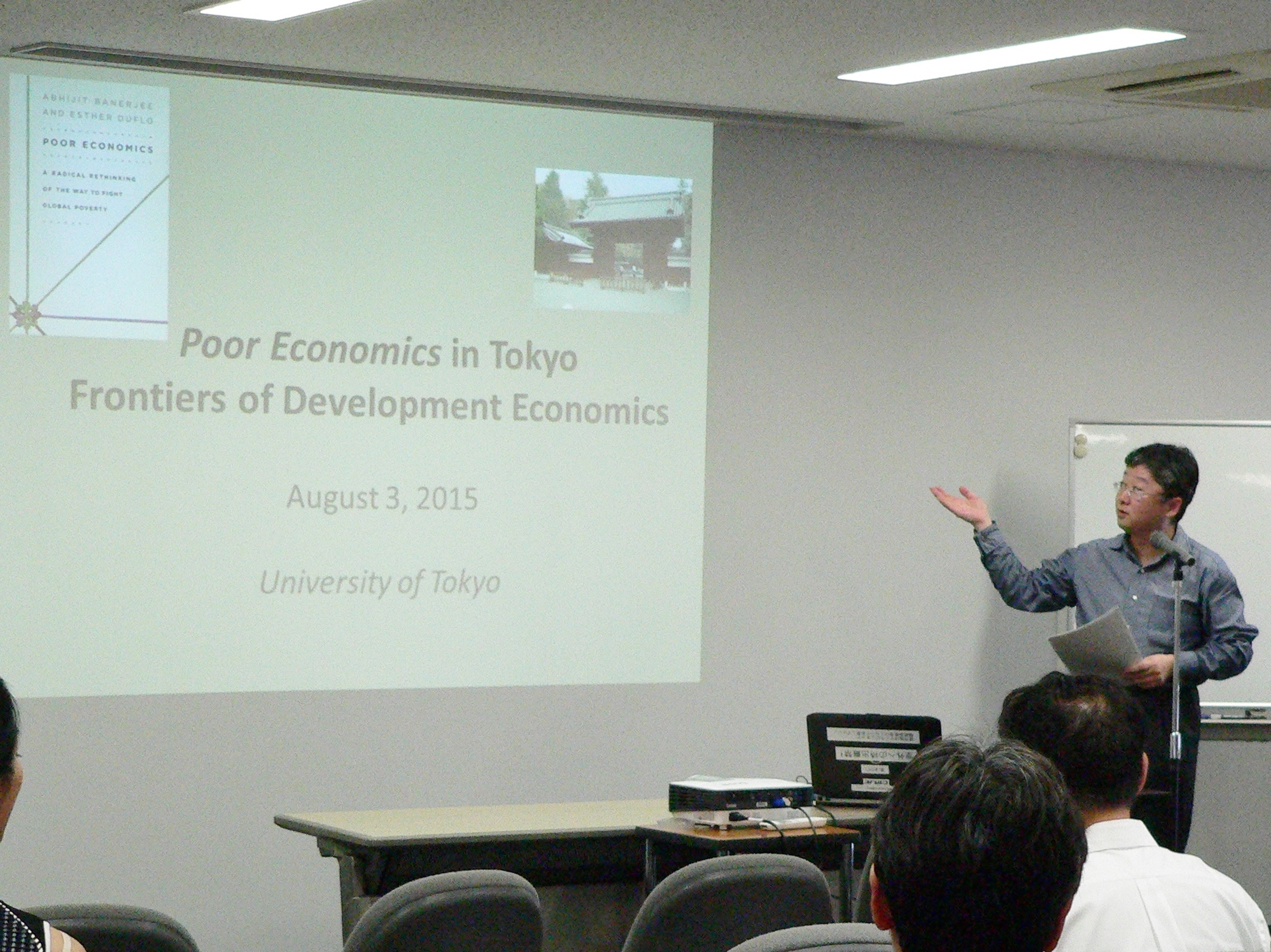
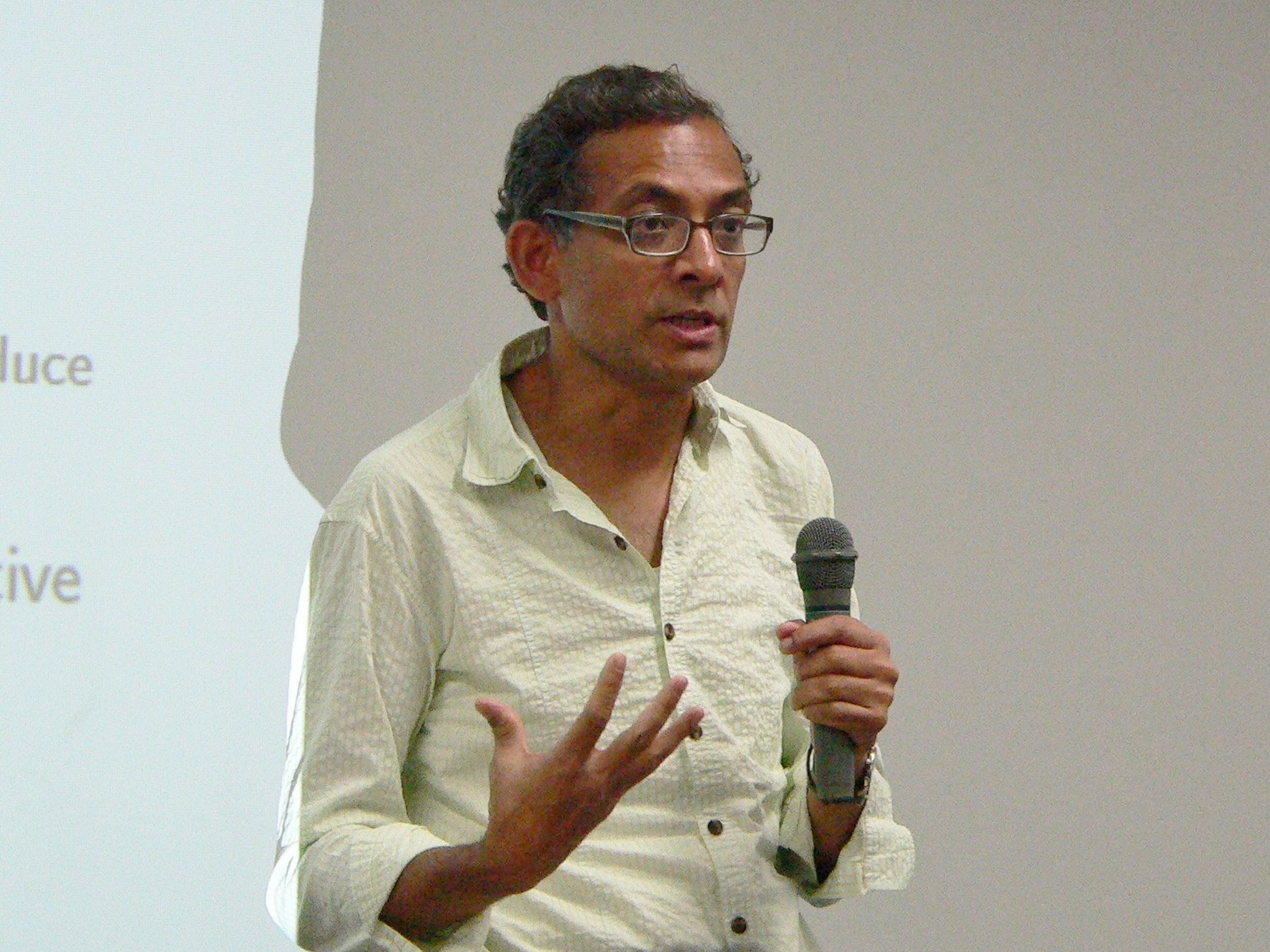
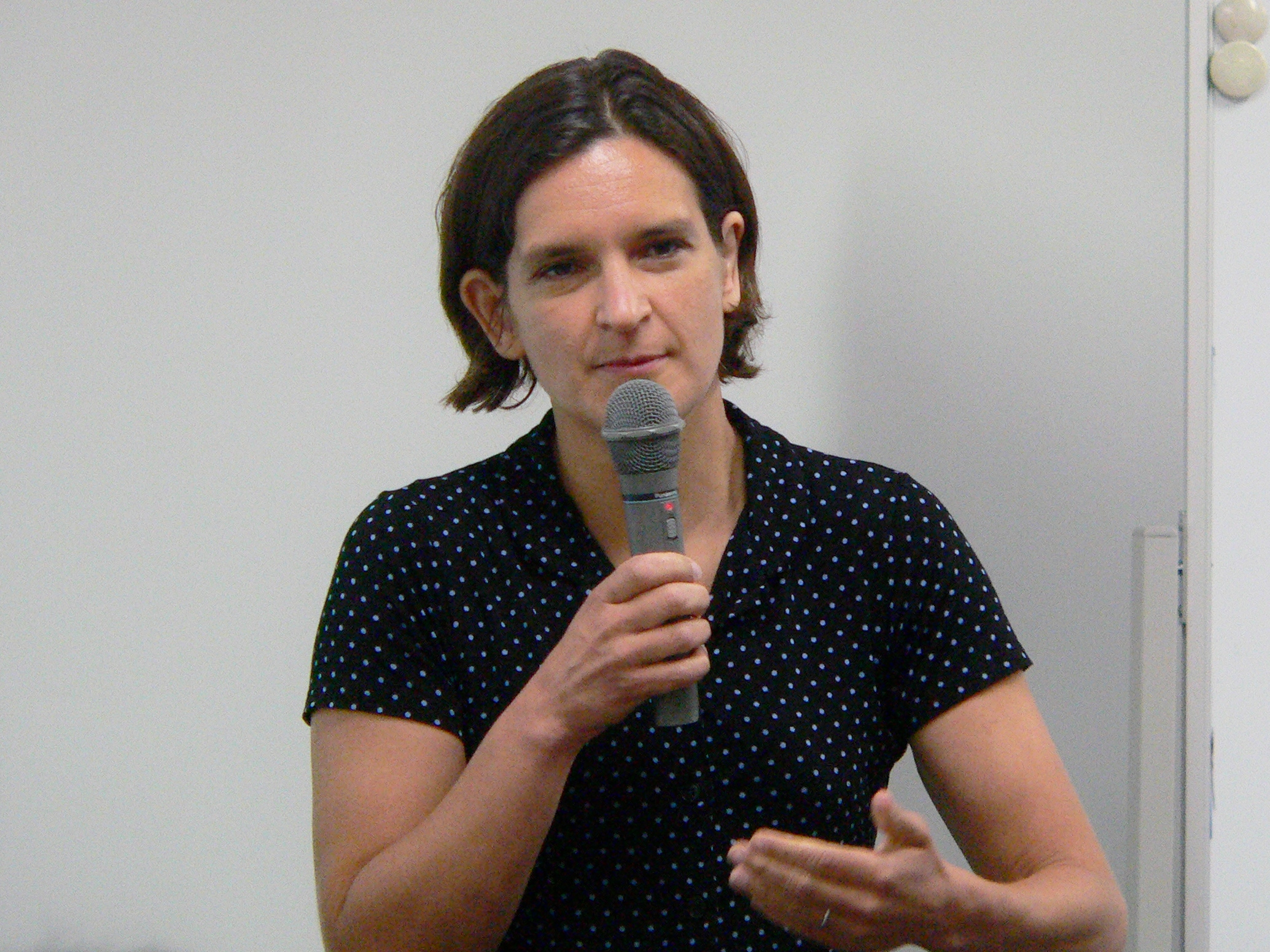
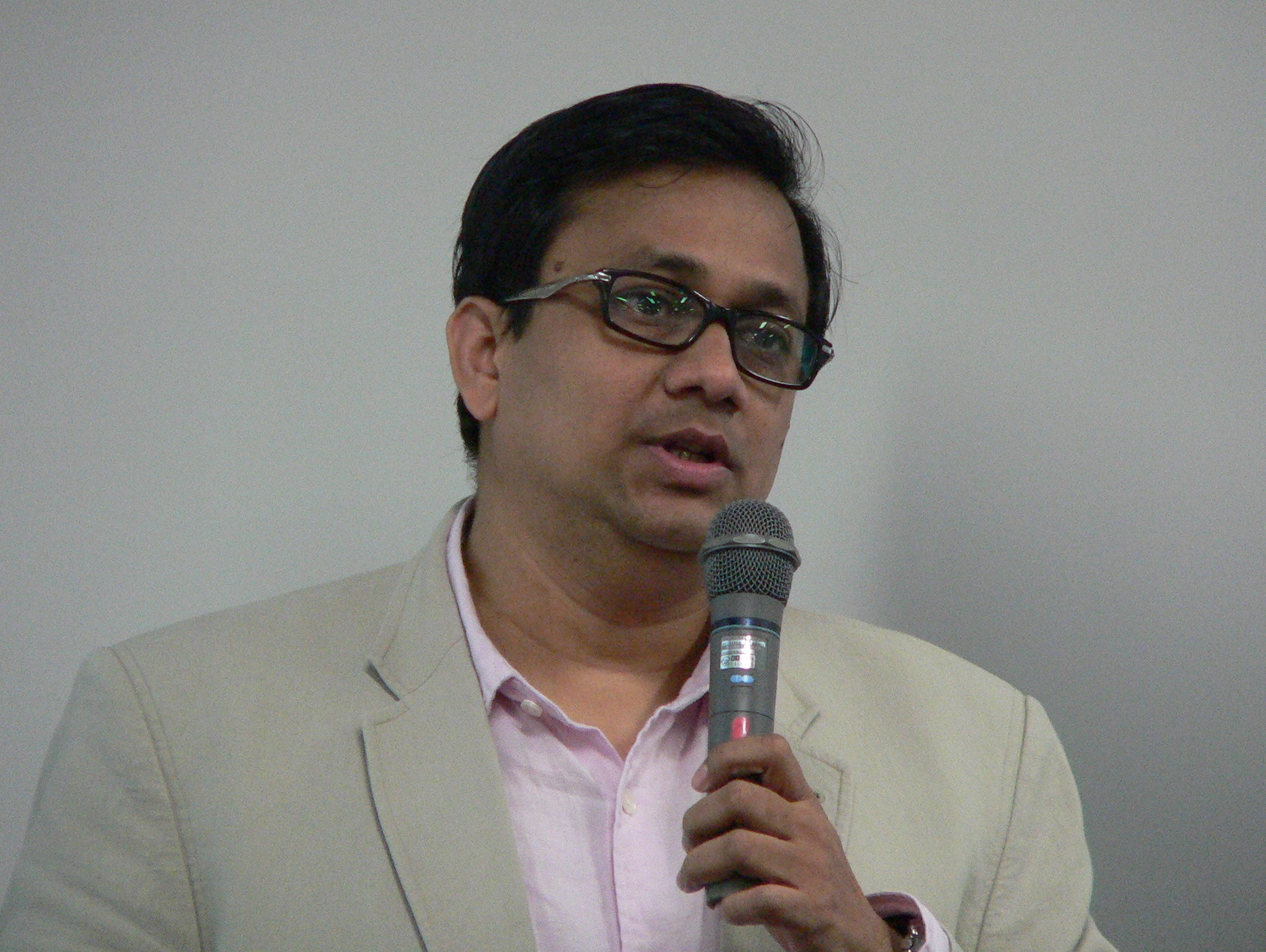
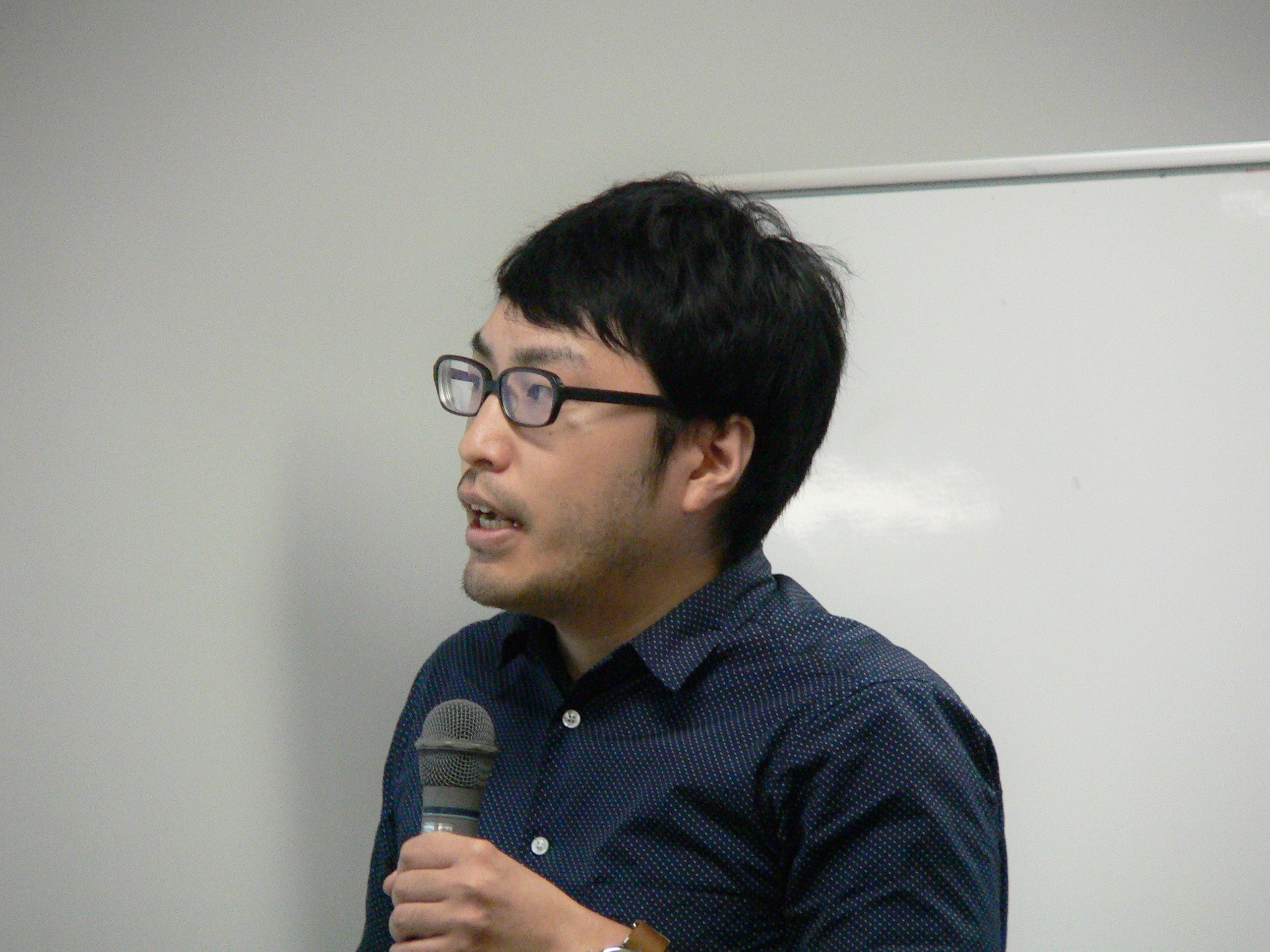
Yasuyuki Sawada of the University of Tokyo organized an international workshop, “‘Poor Economics’ in Tokyo: Frontiers of Development Economics” on August 3rd, 2015. Keynote lectures were given by Professors Abhijit Banerjee and Esther Duflo of Massachusetts Institute of Technology (MIT), co-directors of Jameel Poverty Action Lab (J-PAL), who are the leaders of modern micro development economics using randomized controlled trials (RCTs). Abu Shonchoy of Institute of Developing Economies (IDE), Yasuyuki Sawada, Jun Goto of Hitotsubashi University, and Minhaj Mahmud of BRAC Institute of Governance and Development also made presentations based on RCTs and other quasi-experimental methods. Speakers and participants made lively discussions on forefront development economics research.
The XVIIth World Economic History Congress (WEHC)
- Organizers:
International Economic History Association (IEHA)
Science Council of Japan - August 3-7, 2015
- Venue: Kyoto International Conference Center
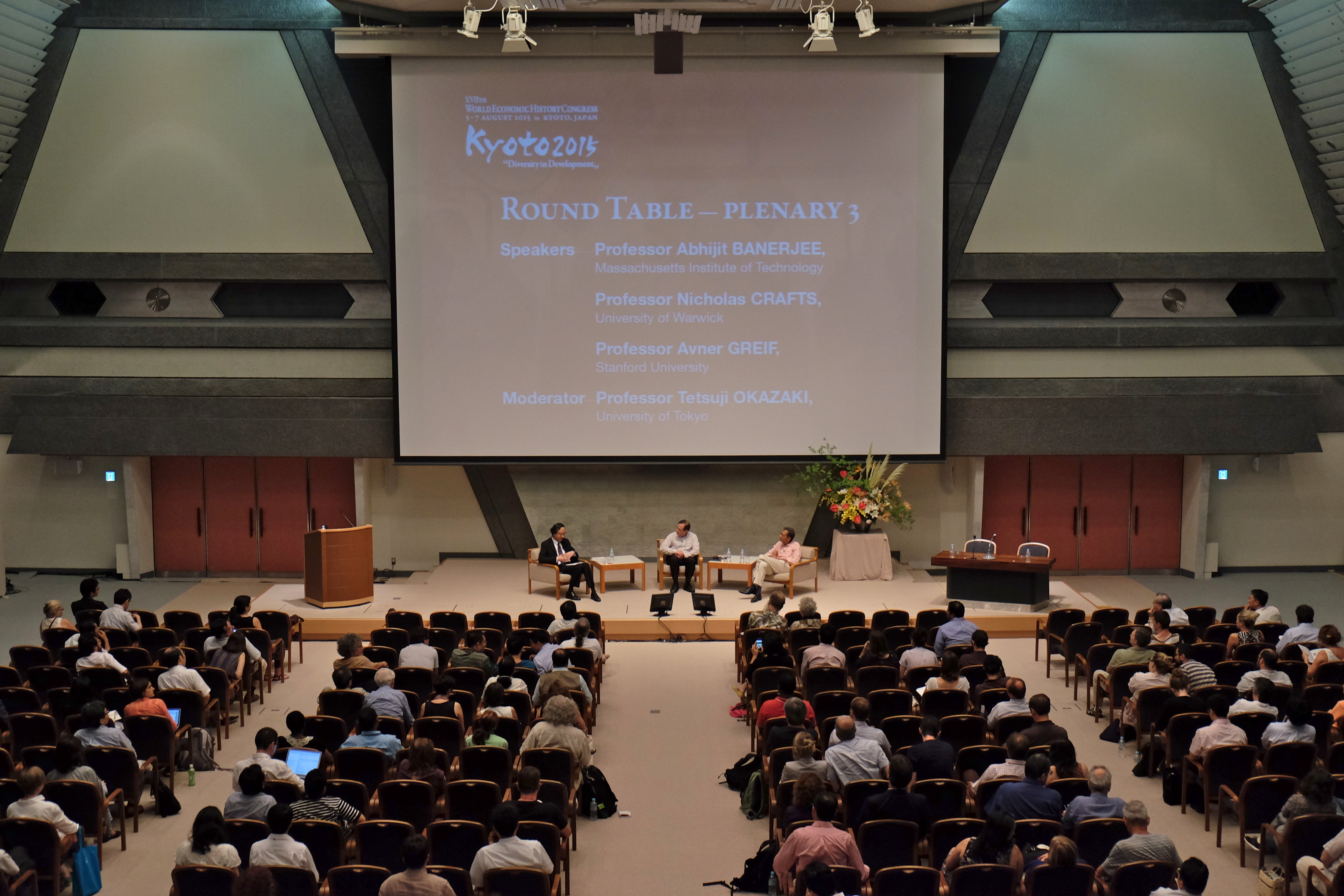
Photo by Norihiko Arakawa
The XVIIth World Economic History Congress (WEHC) was held at the Kyoto International Conference Center from August 3 to August 7, 2015, co-organized by the International Economic History Association (IEHA) and the Science Council of Japan. The main theme was “Diversity in Development”. The congress was composed of three plenary sessions, 178 parallel sessions, the poster session and the dissertation session. To the plenary sessions, we invited Abhijit Banerjee (Massachusetts Institute of Technology), Pranab Bardhan(University of California, Berkeley), Nicholas Crafts ( Warwick University), Avner Greif (Stanford University), Bin Wong University of California, Los Angeles)..The number of the parallel sessions was one of the largest in the 65 years history of the WEHC. 1,202 scholars participated in these sessions, 76% of which were from foreign countries, such as U.S (143), UK (101), China (91), France (56), Netherlands (56) and Spain (56).
2015 Summer School of Econometric Society
- Organizers:
In-Koo Cho (University ofo Illionis)
Ariel Rubinstein (Tel Aviv University)
Akihiko Matsui (The University of Tokyo) - August 3-7, 2015
- Venue: Kojima Conference Room, Economics Research Annex (Kojima Hall), The University of Tokyo
- Program
2015 Summer School of Econometric Society was held at the Kojima Hall in Hongo campus, the University of Tokyo in the period of August 3-7, 2015. The participation in this school was by invitation only and 6 lecturers and 40 graduate students attended from sixteen countries. Professor Ariel Rubinstein, an ex-President of the Econometric Society acted as chair of this school. 6 renowned researchers, In-Koo Cho, Matthew O. Jackson, Nobuhiro Kiyotaki, Vijay Krishna, Debraj Ray and Ariel Rubinstein, gave lectures on the most prominent researches and 18 graduate students gave presentations about forefront research in economics.
IO Conference at The University of Tokyo
- Organizers:
Kei Kawai (New York University)
Hiroshi Ohashi (The University of Tokyo) - June 26 and 27, 2015
- Venue:Venue: Kojima Conference Room, Economics Research Annex (Kojima Hall), The University of Tokyo
- Program
We organized a second empirical IO (industrial organization) conference on the 26th and 27th of June, 2015. The first conference was held in the summer of 2013. Speakers were John Asker (UCLA), Michael Dickstein (Stanford), Igal Hendal (Northwestern), Robin Lee (Harvard), Ariel Pakes (Harvard), along with Michal Farbinger (UT), Naoki Wakamori (Manheim), Hiroshi Ohashi (UT). Lively discussions were made among speakers and a selective group of audience.
Workshop "Incentives, Preferences, and Management in Developing and Developed Countries"
- Organizers:
Hideo Owan (The University of Tokyo)
Yasuyuki Sawada (The University of Tokyo) - April 9, 2015
- Venue: Meeting room, Economics Research Building, The University of Tokyo
- Program
Professor Yasuyuki Sawada of Faculty of Economics and Professor Hideo Owan of Institute of Social Sciences organized a workshop, “Incentives, Preferences, and Management in Developing and Developed Countries" by inviting Professors Oriana Bandiera of LSE, Imran Rasul of UCL, and Albert Park of Hong Kong University of Science and Technology. Based on a unified method of empirical microeconomics or filed experiments on broad management issues, the workshop covered a variety of topics such as time allocation of CEOs in different countries, management and productivity in Japan and Korea, teacher incentives in China, agricultural worker productivity in the Philippines, investors’ incentives in Japan, voluntary contribution to public goods by school management committee members in Burkina Faso, and management of bureaucrats and public service delivery in Nigeria. It is worth noting that the workshop generated lively discussions on the rapidly developing new field of economics of management.


color.png)





